What to Do in Case of Fire
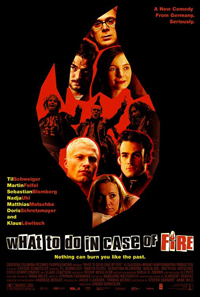 Tangents are something I try to avoid, but this film brought to mind a certain phenomenon that helped me relate to and understand its energy. When a person gets their first tattoo or piercing, especially when they're young, they'll often be met with a patronizing lecture from an elder. The question, “Do you want that on your skin when you're old?” is usually the first of the interrogation, the second being, “Is what the tattoo means really that important?” Like many youngsters, I got my first tattoo and felt marked and personalized at the time. I was an individual who saw herself devoted to certain things; I wanted to carry them with me always. A few years passed and I became less outspoken and devoted to other things. By early adulthood, my piercings had been removed, my hair was no longer tousled and my subversive literature was donated to the Goodwill. There wasn't a loathing for the tattoos—the only thing I couldn't get rid of and the only thing linking me to my past self. The feeling towards them was more fascination. I learned to wear the markings with pride, though it had nothing to do with the symbols or what they represented. They have crystallized many feelings that I used to have; aggression, radicalism, passion, and overpowering self-love. I look at them to be reminded of that.
Tangents are something I try to avoid, but this film brought to mind a certain phenomenon that helped me relate to and understand its energy. When a person gets their first tattoo or piercing, especially when they're young, they'll often be met with a patronizing lecture from an elder. The question, “Do you want that on your skin when you're old?” is usually the first of the interrogation, the second being, “Is what the tattoo means really that important?” Like many youngsters, I got my first tattoo and felt marked and personalized at the time. I was an individual who saw herself devoted to certain things; I wanted to carry them with me always. A few years passed and I became less outspoken and devoted to other things. By early adulthood, my piercings had been removed, my hair was no longer tousled and my subversive literature was donated to the Goodwill. There wasn't a loathing for the tattoos—the only thing I couldn't get rid of and the only thing linking me to my past self. The feeling towards them was more fascination. I learned to wear the markings with pride, though it had nothing to do with the symbols or what they represented. They have crystallized many feelings that I used to have; aggression, radicalism, passion, and overpowering self-love. I look at them to be reminded of that.
What to Do in Case of Fire is the story of punk anarchists who grew up and, for the most part, carried on lives that would have been considered "selling out" in their youth. The year was 1987, and a group of young people were fed up with their unsuccessful riots and the obscurity of their homemade propaganda films. They decided to make one final film, How to Make a Homemade Bomb, and, using chemicals, feces, and a cooking pan, they tell their non-existent audience how to assemble the bomb, dispose of the evidence and leave it in an abandoned building. The bomb didn't go off, though.
The Rabbit is Me
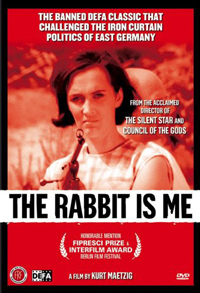 With films that have been or are currently banned in their country of origin comes an instant intrigue in me. Apparently this film was banned for “exposing the harsh realities of East German society,” but that statement, seen on the back of the DVD cover, is a little ambiguous. While watching the film you do get a vague understanding of the politics and lack of justice in the judicial system of 1960s Germany; you begin to understand that the film's “anti-socialist” message could have come as a great threat. However, there is a lot left unexplained—a lot that you have to go and research on your own, and that's not necessarily a bad thing. Somehow you don't mind being led into a haze because the film's heroine, a blacklisted 19-year old, is an astounding portrait of the system's failure. Her will to overcome the setbacks of an “opportunist” and unjust society gives you hope. It's that hope of something better and more democratic that could have been contagious, and was therefore silenced. Still, The Rabbit is Me is hailed as one of the most important New Wave films to come out of Germany.
With films that have been or are currently banned in their country of origin comes an instant intrigue in me. Apparently this film was banned for “exposing the harsh realities of East German society,” but that statement, seen on the back of the DVD cover, is a little ambiguous. While watching the film you do get a vague understanding of the politics and lack of justice in the judicial system of 1960s Germany; you begin to understand that the film's “anti-socialist” message could have come as a great threat. However, there is a lot left unexplained—a lot that you have to go and research on your own, and that's not necessarily a bad thing. Somehow you don't mind being led into a haze because the film's heroine, a blacklisted 19-year old, is an astounding portrait of the system's failure. Her will to overcome the setbacks of an “opportunist” and unjust society gives you hope. It's that hope of something better and more democratic that could have been contagious, and was therefore silenced. Still, The Rabbit is Me is hailed as one of the most important New Wave films to come out of Germany.
In the film we find a 17-year old Maria (Angelika Waller) at the end of her high school education. Like all of her peers, she's exceptionally bright and a strong-willed young lady. She and her brother are orphans who live with their aunt (Ilse Voigt), and just before graduation, two officers come calling. They inform the broken family that their brother/nephew, Dieter (Wolfgang Winkler), is being charged with inciting subversive material, which could lead to a 3-year prison sentence. They try to appear at his trial but are removed on questionable grounds from the courtroom. Young Dieter loses the trial. Before being locked up he's able to see his family, and he warns his sister to be wary of two people. The prosecutor and the judge who put him away, Paul Deister.
In China They Eat Dogs
 Arvid (Dejan Cukic) is a pushover who can't seem to find his way in life. He works at a bank and lives with his girlfriend, Hanne. The two get into an argument over breakfast because Arvid donated 800 crowns to a church fund—money that Hanne wanted to use for shopping. As he tries to move past the dispute unscathed she makes him out to be a boring purist who's trying to save the world.
Arvid (Dejan Cukic) is a pushover who can't seem to find his way in life. He works at a bank and lives with his girlfriend, Hanne. The two get into an argument over breakfast because Arvid donated 800 crowns to a church fund—money that Hanne wanted to use for shopping. As he tries to move past the dispute unscathed she makes him out to be a boring purist who's trying to save the world.
We then jump to Richard (Lester Wiese), a traveling American who settles into a seat at a bar and has a mysterious meeting with Arvid at noon. The bartender and a patron start to chat with him. With two hours to spare until Arvid's arrival, he recaps the recent series of events that have put Arvid in a delicate situation—a man who up until 12 days prior Richard had never heard of.
Léon Morin, Priest
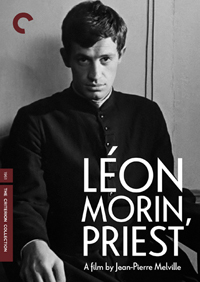 Theism has always been a dominating and polarizing subject in philosophy. For the late philosophers who were atheists, their argument against God's existence often clashed with the popular arguments of reason that suggest we all have a soul. The question of whether or not this soul needs salvation cannot ever be answered. Léon Morin, Priest has a character that goes as far as to suggest the need for uncertainty in religion. Without it, the priest claims, there wouldn't be a cause for faith. As in love, he compares devotion to God as merely a “leap of faith”--a belief held by many theists and philosophers. But for Barny, his latest attempt at conversion, one cannot compare the loves of the flesh with that of a Holy spirit.
Theism has always been a dominating and polarizing subject in philosophy. For the late philosophers who were atheists, their argument against God's existence often clashed with the popular arguments of reason that suggest we all have a soul. The question of whether or not this soul needs salvation cannot ever be answered. Léon Morin, Priest has a character that goes as far as to suggest the need for uncertainty in religion. Without it, the priest claims, there wouldn't be a cause for faith. As in love, he compares devotion to God as merely a “leap of faith”--a belief held by many theists and philosophers. But for Barny, his latest attempt at conversion, one cannot compare the loves of the flesh with that of a Holy spirit.
Following the Italian occupation in France during WWII, a small village is now met with the hostility of Nazi Germany. As the German troops move in to capture and deport Jews, many townspeople scuffle to prove their allegiance to Christ. Children are given hasty baptisms in large numbers and the widows of men lost in battle try desperately to stay true to France while deceiving the Nazi regime. Barny (Emmanuelle Riva) is one of these women. Husbandless and with a young daughter, she decides to visit the Catholic church to seek advice. Though she's an atheist, the village leaves no other options in charitable good will. Of the two priests available to speak to she chooses Léon Morin (Jean-Paul Belmondo), a 26-year old man from a modest family. She expects to be met by a man who blindly lays claim to God but is surprised at his complex outlook on faith and his willingness to tolerate her absence of it.
Fat Girl

Doctor: " What are you doing here, honey? You’re not even old enough to know how bad life gets." Cecilia: "Obviously, doctor, you’ve never been a 13-year-old girl." -- Sofia Coppola’s The Virgin Suicides Rarely can one witness the gift of a film that has the gut and the power to deliver a story of the complex and trying "coming of age" which we all had to endure. Even more scarce is work surrounding the female perspectives of such experience. To shy away from female sexuality and experimental thought is an exercise used to the point of exhaustion in modern cinema. Catherine Breillat, on the other hand, has made a point of idolizing masters in the art of capturing the human condition and therefore has made many films doing just the opposite of her counterparts. Out of these, which include A Real Young Girl and 36 Fillette, Fat Girl dominates as a bold and provocative juxtaposition between two sisters, spiraling through two very different types of disgrace.
Anaïs Pingot and her sister, Elena, are on holiday with their mother. Typical of any vacation-town, spouts of ennui and a lack of familiarity cause these two sisters to roam aimlessly through the town in search of some kind of amusement. While dining at a local restaurant they meet Fernando, an Italian college-age man who is automatically drawn to the beauty and flirtatiousness of the 16-year old Elena, while the overweight 12-year old, Anaïs, simply stands by and allows her sister to soak up his affection. But as the vacation proceeds so does their sibling rivalry and the hastened and inappropriate relationship between Elena and Fernando. Here we gaze and experience, through the point-of-view of Anaïs, the desire to be wanted and the helplessness of seeing the innocence of a loved one shattered.
Continue ReadingMurmur of the Heart

Some of Louis Malle’s most daring films capture the bewilderment that comes with entering young adulthood. Features such as Au Revoir Les Enfants and Pretty Baby not only guide the audience through the tender and turbulent times of their leading youth, but also deliver a glimpse of the social environment and conditions in which they live. Murmur of the Heart is, in few words, a nuance of intimacy and perhaps a re-working of the Oedipus complex. It follows Laurent—a fifteen-year-old boy whose aristocratic identity and layered personality result in a constantly altered state of mind and lavish exercises in rebellion. Due to his social standing and education Laurent is not your average fifteen-year old, and thanks to the privileges of a lax society and the perspective of older, rambunctious brothers, he has come to think of himself as a young man. The current leading lady in his life is his mother; a beautiful Italian who, like a girl of a much younger age, is constantly impressed and smitten with Laurent’s charm and innocence. Known to his older brothers and surrounding family as "sensitive" and intellectual, Laurent also shares a certain vulnerability to jazz, theft, and women. All of this is put to a halt, however, when Laurent develops a heart murmur and is sent on vacation with his mother to receive treatment. With plenty of free time and leisurely activities, Laurent and his mother grow even closer than before, ultimately leading to displays of affection that must later become secrets, and yet are still handled, by Malle, with delicacy.
For a first-time feature-length actor, young Benoît Ferreux is full of surprises. Laurent’s character is like a balanced mesh of puppy dog and tyrant, which somehow blends to make an odd and highly entertaining finished product. Portraying the unmasked desire by boys of this age and social class to become men is a refreshing alternative to the rough-edged machismo upbringings we often see presented in film. For Ferreux to be able to grasp that concept early and portray it correctly is in itself a promise of the fruitful career that was to come.
Continue ReadingStroszek

Stroszek is the story of a man living in a world where he doesn't fit in. The film’s lead character, Stroszek, is a 45-year old German street musician who lacks the common everyday living and social skills that it takes to get by in life. At the beginning of the film Stroszek is released from prison after serving time for flagrancy and public drunkenness. With his new found freedom he goes straight into a bar and orders a beer. This is where we first meet another social misfit and friend of Stroszek, the prostitute Eva. As Stroszek adjusts to his new life he begins to encounter the harshness of the outside world. Eva’s pimp begins to terrorize and abuse her for what appears to be the mere fun of it. Stroszek, Eva, and Stroszek’s senile neighbor Scheitz, unable to defend themselves, decide to leave the country and sail to America, the land of opportunity.
With the promise of work and a place to live the three of them make their way to Wisconsin to live with a long lost relative of Scheitz. The journey is exciting and promising as they arrive in New York City, and their arrival in Wisconsin is even more joyous. Stroszek gets a job working in a mechanics’ garage, Eva gets a job as a waitress at a local truck stop, and with a loan from the bank they buy a deluxe mobile home with all the modern amenities. All is happy in the world for the moment, but Stroszek soon begins to worry when bank payments they can’t afford start coming in. The situation then goes from bad to worse for Stroszek who eventually reaches the end of his rope in a dingy diner located on a small Indian Reservation. This is where the film reaches it emotional and bizarre conclusion.
Continue ReadingSitcom
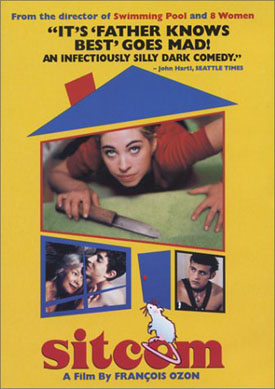 François Ozon is known, for the most part, for his thrillers and films that more or less focus on romantic scenarios, whether they be heterosexual or homosexual. His films have a touch of absurdity, but not always necessarily for absurdity's sake, if that makes any sense. Sitcom is my personal favorite among his works because it takes the concept of a sitcom—the suburban family with teenage children—and heightens it to incomparable and outrageous extremes. These sorts of television series are usually about families pulling together to overcome obstacles that every family eventually faces. For many viewers, they present a fantasy in which you can escape your own family, with subjects that many view as perfect. Some even see these characters as people to measure up to. I'm more referring to shows like The Cosby Show, where people have a cookie-cutter existence. However, in the mid-to-late '90s, there was a trend of shows that gave you the exact opposite feeling, like Married with Children. These shows were unrealistic, often trashy depictions of home life that were pleasurable because they came off as something that an average person could measure up to. Not to mention people found the tastelessness funny. But the bar was lowered, so to speak. Ozon's Sitcom lowers the bar even further and takes its time presenting a ludicrous plot that glorifies fetishism, tactlessness, neurosis, and sociosexual disarray.
François Ozon is known, for the most part, for his thrillers and films that more or less focus on romantic scenarios, whether they be heterosexual or homosexual. His films have a touch of absurdity, but not always necessarily for absurdity's sake, if that makes any sense. Sitcom is my personal favorite among his works because it takes the concept of a sitcom—the suburban family with teenage children—and heightens it to incomparable and outrageous extremes. These sorts of television series are usually about families pulling together to overcome obstacles that every family eventually faces. For many viewers, they present a fantasy in which you can escape your own family, with subjects that many view as perfect. Some even see these characters as people to measure up to. I'm more referring to shows like The Cosby Show, where people have a cookie-cutter existence. However, in the mid-to-late '90s, there was a trend of shows that gave you the exact opposite feeling, like Married with Children. These shows were unrealistic, often trashy depictions of home life that were pleasurable because they came off as something that an average person could measure up to. Not to mention people found the tastelessness funny. But the bar was lowered, so to speak. Ozon's Sitcom lowers the bar even further and takes its time presenting a ludicrous plot that glorifies fetishism, tactlessness, neurosis, and sociosexual disarray.
The family in focus starts out average; a father (François Marthouret) who's the breadwinner and fairly detached from everyone; a mother (Évelyne Dandry) who does the child-rearing and is a nervous wreck; a son, Nicolas (Adrien de Van) who is introverted and academic; a promiscuous daughter, Sophie (Marina de Van) with charm, a cute boyfriend and a lot of vulnerability. They get a Spanish maid, Maria (Lucia Sanchez) who is married to a man from Africa named Abdu. The balance is stagnant—not a threat to the viewer or even that interesting. One day the father comes home with an albino lab rat, which is met with adoration from everyone except the mother, who finds it repulsive.
1-900 (aka 06)
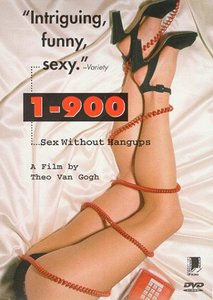 Using a cast of only two people and a set of two homes, 1-900 attempts to explore the dynamics of a relationship between two people who can't have a functional relationship with someone they can physically approach. Through a sex hotline, a woman named Sarah (Ariane Schluter) describes herself as an art enthusiast and an open-minded intellect. A man named Thomas (Ad van Kempen) responds to her ad with his phone number, and Sarah calls him back on a Thursday night. The awkwardness of their first conversation is no different than that which occurs during a first date. They inquire about past marriages, children, age, occupation and so on. The man claims to be 33, with features that are a far cry from reality. The woman does the same, except she presents herself as someone more “ethnic” than she really is. The imagination aspect to the experience distracts them from the sole purpose of the hotline. So, seeing as how they did in fact meet through a sex agency, they eventually try to move the conversation towards sex. Neither of them actually undresses nor makes a motion to participate. It shows through Sarah’s giggling and Thomas's fear of being mocked by her, or worse, overheard by someone who may or may not be in the room with her. The conversation ends despairingly, but Sarah calls back the following Thursday and wholeheartedly starts to participate. Thomas is then more than happy to oblige.
Using a cast of only two people and a set of two homes, 1-900 attempts to explore the dynamics of a relationship between two people who can't have a functional relationship with someone they can physically approach. Through a sex hotline, a woman named Sarah (Ariane Schluter) describes herself as an art enthusiast and an open-minded intellect. A man named Thomas (Ad van Kempen) responds to her ad with his phone number, and Sarah calls him back on a Thursday night. The awkwardness of their first conversation is no different than that which occurs during a first date. They inquire about past marriages, children, age, occupation and so on. The man claims to be 33, with features that are a far cry from reality. The woman does the same, except she presents herself as someone more “ethnic” than she really is. The imagination aspect to the experience distracts them from the sole purpose of the hotline. So, seeing as how they did in fact meet through a sex agency, they eventually try to move the conversation towards sex. Neither of them actually undresses nor makes a motion to participate. It shows through Sarah’s giggling and Thomas's fear of being mocked by her, or worse, overheard by someone who may or may not be in the room with her. The conversation ends despairingly, but Sarah calls back the following Thursday and wholeheartedly starts to participate. Thomas is then more than happy to oblige.
On Thursdays Sarah continues to call and the two slowly warm up to and become dependent on each other’s company. Thomas is an architect who loves boring people with his passion for creating structures. Sarah is an art professor who shares secrets that do more than provoke. Their conversations don't always lead to having mutual phone sex; sometimes one of them will pretend to listen to the other talk while secretly getting-off on the sound of the other’s voice. Both Sarah and Thomas become too comfortable and, in their own right, selfish with their desires. Jealousy becomes a factor in their relationship when Sarah’s actual rendezvous with people outside of what they share are claimed, by Thomas, to constitute infidelity. While he's under the impression that he is “in her soul” and a real part of her life, she constantly reminds him that their circumstances are anything but soulful. Thomas's frustration over her power (she hasn't disclosed her own number and always calls him) starts to create larger problems. His prying becomes threatening when he discovers her real name and address by chance. With the possibility of him digging into her past and discovering her biggest secret, or ruining her good name, the two grow apart and lose the magic of anonymity.
Loulou
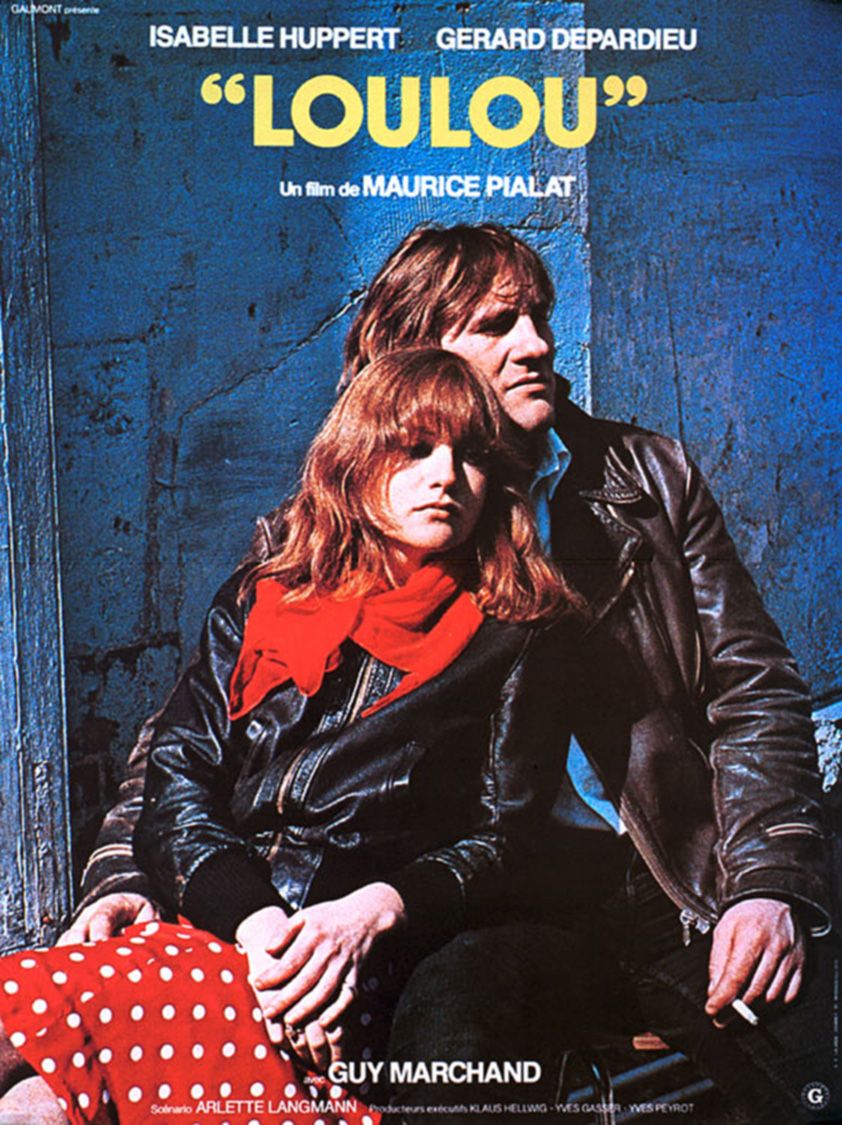 Some of the most daring romantic dramas are ones in which the lovers in question are total opposites, or with each other for reasons that don't have anything to do with love. While anticipating their breakup throughout the film's entirety, you take on the role of a mediator in your imagination. You notice the flaws in each lover, and how those very flaws attract the other person. You take sides in their disputes depending on whoever seems to be more tolerable. It's precisely this kind of intrusion—the ability to analyze and compare someone's circumstances with your own—that makes the story work and keeps you invested.
Some of the most daring romantic dramas are ones in which the lovers in question are total opposites, or with each other for reasons that don't have anything to do with love. While anticipating their breakup throughout the film's entirety, you take on the role of a mediator in your imagination. You notice the flaws in each lover, and how those very flaws attract the other person. You take sides in their disputes depending on whoever seems to be more tolerable. It's precisely this kind of intrusion—the ability to analyze and compare someone's circumstances with your own—that makes the story work and keeps you invested.
In the film Gerard Depardieu plays Loulou, a penniless playboy and ex-con who prides himself on breaking girls' hearts by flaunting his unwillingness to be monogamous. His whipped ex-girlfriend Dominique follows him around like a sick puppy, giving us the perfect illustration of his effect on women and their willingness to be spat on while in or out of a relationship with him. At a discotheque he falls under the bewitching spell of Nelly (Isabelle Huppert), a married woman from an upscale background who's been followed to the club by her husband Andre (Guy Marchand). As he watches her dance and flirt with Loulou, he comes to the conclusion that she needs to be outed as a tramp in public. Following his verbal and physical abuse, Nelly decides to start her first extramarital affair with Loulou.





